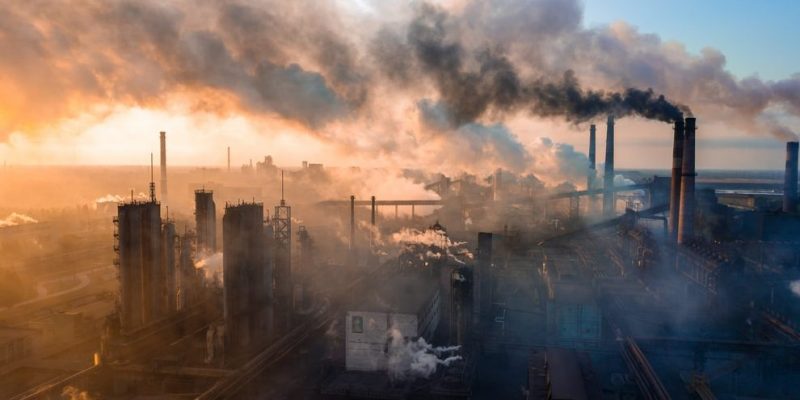We explain what capitalism is, its history, characteristics and why it is criticized. Also differences with socialism or communism.

What is capitalism?
Capitalism is the socioeconomic system prevailing in the West after the fall of medieval feudalism, and dominant in the entire world today of the 21st century. It is a system typical of bourgeois industrial societies.
Its two main and defining features are: private ownership of the means of production and free economic exercise. Its name comes from the idea of capital, that is, the central role of money in the relations of production and consumption.
Capitalism proposes that money marks the measure of the exchange of goods and services, and that it is obtained in different ways:
- As work remuneration in the case of workers.
- Coming from the income in the case of the owners.
- As a result of risk and investment in the case of businessmen or entrepreneurs.
For all of this to be possible, it is necessary that private property exists, and that the productive and commercial exercise is free, that is, that everyone invests in what they want and reaps the fruits or losses that the market brings.
In capitalist societies, therefore, the relations of production and work, and consumption of goods and services, are determined respectively by a wage system and a price system. In this way, individuals consume what the amount of money they produce allows them.
The entire society functions, then, seeking to obtain a benefit, that is, an economic income greater than expenses, which allows a surplus of capital (with which to consume, invest or save).
in capitalism “self-regulation” of the market is central which marks the relationship between supply and demand: the most in-demand (and therefore more scarce) products become more expensive, while the less in-demand (and therefore more abundant) products become cheaper. This idea is the subject of numerous debates. It is often known as the “invisible hand” of the market.
See also: Neoliberalism
Characteristics of capitalism
Capitalism can be characterized as follows:
- Proposes capital as a measure of economic relationship and its obtaining through economic freedom and the exploitation of private property. For this, it is essential that the latter be allowed and protected by the State.
- Capitalism It is the economic system typical of industrial and bourgeois societies and its appearance marked the end of feudalism. The bourgeoisie (merchants and later industrialists) displaced the aristocracy (landowners of noble descent) as the dominant social class.
- It is based on the idea of supply and demand: goods and services are demanded by their consumer public, and offered by their producers. Depending on how this relationship occurs, the products will be more or less expensive and more or less abundant.
- As a system, capitalism promotes competition and rewards risk entrepreneurship and innovation, which translated in the 20th century into unbridled technological development. At the same time, it allows and rewards speculation and usury, allowing the generation of profit from debt, interest and other unproductive activities.
There are or have been different models of capitalist system, such as:
- Protectionism. According to which the State sets tariffs and regulations to artificially make products from abroad more expensive, and thus protect its industry and encourage the consumption of national goods and services.
- Laissez-faire (from the French “let it be done”) That limits the interference of the State to the maximum and allows the greatest share of freedoms to the market, without regulations of any kind.
- Social market economy. Completely contrary to the previous one, it states that the economic exercise must be guided and planned by the State, without going to the extreme of suffocating fundamental economic freedoms.
- Corporate capitalism. In which the market is dominated by hierarchical corporations and large economic groups that exercise power and determine the market.
On the other hand, capitalism builds a society divided into social classes according to their economic income and possession of capital (or property). These social classes are, according to the Marxist view of capitalism:
- The bourgeoisie and upper bourgeoisie. Owner of the means of production (factories, stores, etc.), or of large investment capital.
- The working class. Whose participation in society is to sell their work capacity, whether qualified (professionals, technicians) or not (workers).
- The lumpen The unproductive sector of society.
Origin and history of capitalism

Capitalism has not always operated in the same way it does today. Although Its formal beginnings date back to the 16th and 17th centuries there were important antecedents at various times and places in history.
Its most direct antecedent is located towards the end of the Middle Ages, as a new dominant social class emerged from feudal society: the bourgeoisie, whose commercial activity allowed the accumulation of money or other assets (merchandise, and later machinery), which It is a fundamental feature for the emergence of capitalist logic.
The origin of capitalism It was strongly determined by the expansion of the English textile industry from the 17th century onwards thanks to the massification of work. In the 18th century, with the first artisanal machines, the industrial mode of production began.
The emergence of The first nation-states and the Industrial Revolution were key elements in the establishment of the new system in Europe.
The spirit of classical capitalism of the time was understood by the Scottish economist and philosopher Adam Smith (1723-1790). It was captured in his The wealth of nations (1776), from which the central foundation of the free market emerged, which advised the least possible interference by the State.
His ideas were later part of the philosophy of Liberalism of the 19th century, an era that witnessed the development of the factory system, and the gigantic exodus from rural to urban regions that this caused, thus giving rise to the working class or proletariat.
From then on, capitalism underwent enormous changes in its mode of operation, driven by the economic catastrophes of the 20th century and its two world wars. Furthermore, the constant technological innovation that marked the second half of that century, until capitalism became global at the beginning of the 21st century.
Criticisms of capitalism

Capitalism has been harshly criticized from two perspectives, mainly: Marxist and ecological.
According to the historical materialism proposed by Marx, capitalism is an inherently unjust system of production in which the proletarian classes are exploited by the bourgeoisie as labor. In exchange, they obtain a salary that they use to consume, among other things, the goods that they themselves produced.
That is, that the work of the workers is capitalized by the bourgeoisie which extracts a surplus value or profit from it, thus exempting itself from taking part in the work.
This view, born within the brutal capitalist society of the 19th century, proposed that capitalism reproduced poverty, benefiting only the wealthy classes, who needed large numbers of workers to exploit.
20th century capitalism achieved economic development and a welfare state that immensely raised living standards in Europe and the United States, softening the harmful effects of capitalism there and displacing them toward underdeveloped nations. thus creating an unequal world. Furthermore, this development was achieved thanks to colonialism and the plundering of the natural resources of the so-called Third World.
On the other hand, ecological criticism points out that industrial activity and the energy consumption that sustains the capitalist model of production It is unfeasible and unsustainable over time since it imposes a very high ecological cost on the planet. Climate change, environmental pollution and the destruction of ecosystems are part of the responsibilities attributed to the global capitalist model.
Capitalism, socialism and communism

Throughout the 20th century, capitalism in the West and in other parts of the world It was defended as the socioeconomic alternative to communism. The latter was developed by the totalitarianisms of the eastern bloc.
The conflict between both modes of economic and social organization, known as The Cold War pitted the United States and the USSR as leaders of each group, in the fields of economics, technological innovation, political influence and military force. However, it was an indirect confrontation: neither of these countries declared war on the other.
The traditional position, inherited from the conflict, highlights capitalism's freedoms, its innovation and its competitiveness model in the face of the oppression and poverty experienced in the communist regimes of Asia and Eastern Europe. At the same time, communism aspired to a society without social classes and without the injustices of capitalist countries.
On the other hand, today socialism It is considered a doctrine that, inserted in the capitalist world, tries to manage the exercise of the market through the State to force it to respond to the economic and social needs of the population.
Many relatively successful capitalist countries have models labeled socialist or, at most, social democratic. That is to say, they try to “domesticate” capitalism to give it a more human face.
References
- “Capitalism” on Wikipedia.
- “Capitalism” (video) in Educatina.
- “Capitalism or socialism?” (video) in CuriosaMente.
- “What is capitalism?” on Filosofia.net.
- “History of Ideas – Capitalism” (video) in The School of Life.
- “Capitalism” in The Encyclopaedia Britannica.





